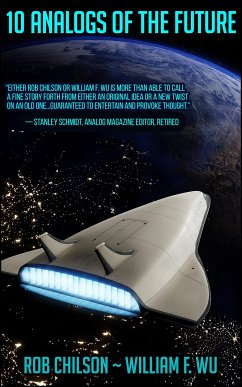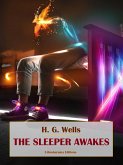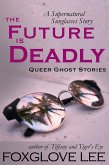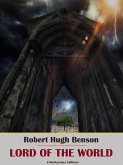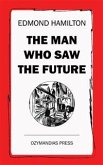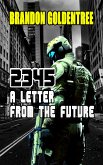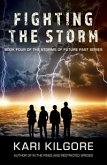Longtime science fiction writers Rob Chilson and William F. Wu collaborated on these ten stories, all of which first appeared in Analog Science Fiction and Fact magazine. Chilson is especially known for his work in Analog, as is Wu, a finalist for multiple Hugo and Nebula awards. This collection is enhanced by their light-hearted, informative introduction and afterwords to each story.
~~~~~ Excerpt ~~~~~
Roger was dozing in his seat when he felt the familiar small hands and bony knees of his daughter climbing into his lap. He opened his eyes and put one arm around her; she, in turn, had one firm arm around Buffalo Bill’s neck. “Hi, sweetie,” he said, his voice hoarse. “Something the matter?”
Marta looked solemnly out into the starry night. The car seemed to be hovering motionless in the sky. A strange black sky, with no ground visible. Earth was invisible far below them; it could not be seen through any of their windows.
They had flown out of the shadow of Earth, thrown by their retained rotational velocity. Now Roger would keep the sun under them, charge the hull with electricity to ward off the solar wind, and pray. The thermo-electric elements kept the car cool enough, but the floor and walls were warm to the touch. The windows were edged with flame from the sunlight below.
“Where are we?” Marta asked.
Roger cleared his throat. “We’re nearly halfway to the moon, sweetie.” Luna was visible off to the right, as if on the horizon.
“Oh.” She considered the stars thoughtfully. Finally, unexpectedly, she asked, “Are we going to be like the tigers?”
Startled, Roger laughed. “Sure. You like that one?” He used a light tone, to see if she would turn playful.
Marta nodded, meeting his gaze solemnly.
Marta said sleepily, “It’s always night out here,” and touched her nose to his. He kissed her cheek.
“Do you know one about buffaloes?” she asked, cuddling.
“Uh, yeah, I know a song about where buffalo roam. Or used to, at least. Shall I teach it to you?”
“Yeah!”
“Okay.” Roger paused to get the lyrics straight and as he did, he reflected that buffaloes had been confined to zoos and parks even longer than tigers. “Oh, give me a home….”
As he sang and cuddled his daughter, Roger brooded over his position and course. He had been brooding over the course for days. They were approaching turnover time for travel to the Moon or Ell Clusters, and still piling on gee. Luna, of course, was nowhere near his line of flight. He would pass near the L-4 Cluster as space distances go, but it would scarcely be visible.
The transponder had beeped occasionally— it sounded off audibly when tweaked by questing beams, even as it responded. Now Roger shut off its responses. To have come out without filing a flight plan or with a silent transponder would have been a giveaway; the Patrol would have been all over him at once. Now, though, maybe he had left it on too long.
As it was, the transponder had beeped every fifteen minutes or so since he had first been warned of his deviation from his LEO destination. They knew where he was, how fast he was accelerating, and in what direction. Where were they?
Roger hugged his daughter, sang louder as she joined in the chorus. He couldn’t help glancing around at all the windows, expecting to see the prow of a CisLunar Patrol ship, evil menace incarnate, loom near them. If they caught him, he would lose his daughter.
He could think of nothing else to do. He could only run.
~~~~~ Excerpt ~~~~~
Roger was dozing in his seat when he felt the familiar small hands and bony knees of his daughter climbing into his lap. He opened his eyes and put one arm around her; she, in turn, had one firm arm around Buffalo Bill’s neck. “Hi, sweetie,” he said, his voice hoarse. “Something the matter?”
Marta looked solemnly out into the starry night. The car seemed to be hovering motionless in the sky. A strange black sky, with no ground visible. Earth was invisible far below them; it could not be seen through any of their windows.
They had flown out of the shadow of Earth, thrown by their retained rotational velocity. Now Roger would keep the sun under them, charge the hull with electricity to ward off the solar wind, and pray. The thermo-electric elements kept the car cool enough, but the floor and walls were warm to the touch. The windows were edged with flame from the sunlight below.
“Where are we?” Marta asked.
Roger cleared his throat. “We’re nearly halfway to the moon, sweetie.” Luna was visible off to the right, as if on the horizon.
“Oh.” She considered the stars thoughtfully. Finally, unexpectedly, she asked, “Are we going to be like the tigers?”
Startled, Roger laughed. “Sure. You like that one?” He used a light tone, to see if she would turn playful.
Marta nodded, meeting his gaze solemnly.
Marta said sleepily, “It’s always night out here,” and touched her nose to his. He kissed her cheek.
“Do you know one about buffaloes?” she asked, cuddling.
“Uh, yeah, I know a song about where buffalo roam. Or used to, at least. Shall I teach it to you?”
“Yeah!”
“Okay.” Roger paused to get the lyrics straight and as he did, he reflected that buffaloes had been confined to zoos and parks even longer than tigers. “Oh, give me a home….”
As he sang and cuddled his daughter, Roger brooded over his position and course. He had been brooding over the course for days. They were approaching turnover time for travel to the Moon or Ell Clusters, and still piling on gee. Luna, of course, was nowhere near his line of flight. He would pass near the L-4 Cluster as space distances go, but it would scarcely be visible.
The transponder had beeped occasionally— it sounded off audibly when tweaked by questing beams, even as it responded. Now Roger shut off its responses. To have come out without filing a flight plan or with a silent transponder would have been a giveaway; the Patrol would have been all over him at once. Now, though, maybe he had left it on too long.
As it was, the transponder had beeped every fifteen minutes or so since he had first been warned of his deviation from his LEO destination. They knew where he was, how fast he was accelerating, and in what direction. Where were they?
Roger hugged his daughter, sang louder as she joined in the chorus. He couldn’t help glancing around at all the windows, expecting to see the prow of a CisLunar Patrol ship, evil menace incarnate, loom near them. If they caught him, he would lose his daughter.
He could think of nothing else to do. He could only run.

